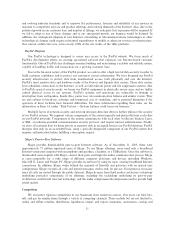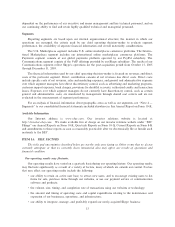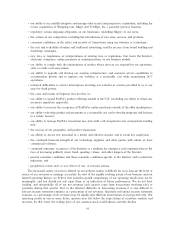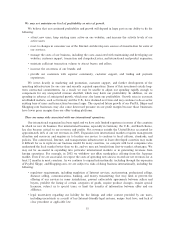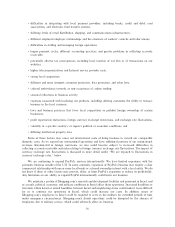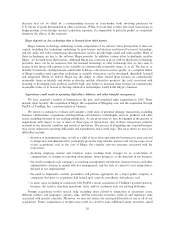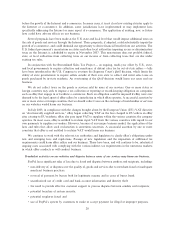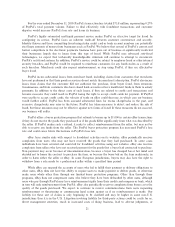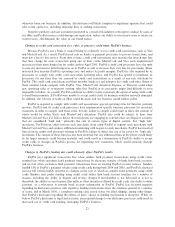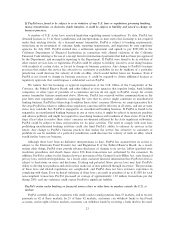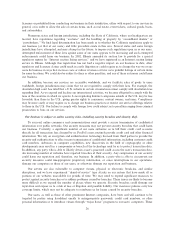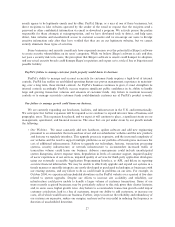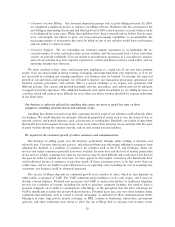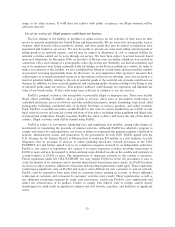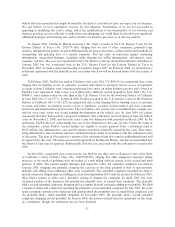eBay 2005 Annual Report Download - page 25
Download and view the complete annual report
Please find page 25 of the 2005 eBay annual report below. You can navigate through the pages in the report by either clicking on the pages listed below, or by using the keyword search tool below to find specific information within the annual report.For the year ended December 31, 2005 PayPal's transaction loss totaled $73.8 million, representing 0.27%
of PayPal's total payment volume. Failure to deal effectively with fraudulent transactions and customer
disputes would increase PayPal's loss rate and harm its business.
PayPal's highly automated and liquid payment service makes PayPal an attractive target for fraud. In
configuring its service, PayPal faces an inherent trade-off between customer convenience and security.
Identity thieves and those committing fraud using stolen credit card or bank account numbers can potentially
steal large amounts of money from businesses such as PayPal. We believe that several of PayPal's current and
former competitors in the electronic payments business have gone out of business or significantly restricted
their businesses largely due to losses from this type of fraud. While PayPal uses advanced anti-fraud
technologies, we expect that technically knowledgeable criminals will continue to attempt to circumvent
PayPal's anti-fraud systems. In addition, PayPal's service could be subject to employee fraud or other internal
security breaches, and PayPal would be required to reimburse customers for any funds stolen as a result of
such breaches. Merchants could also request reimbursement, or stop using PayPal, if they are affected by
buyer fraud.
PayPal incurs substantial losses from merchant fraud, including claims from customers that merchants
have not performed or that their goods or services do not match the merchant's description. PayPal also incurs
losses from claims that the customer did not authorize the purchase, from buyer fraud, from erroneous
transmissions, and from customers who have closed bank accounts or have insufficient funds in them to satisfy
payments. In addition to the direct costs of such losses, if they are related to credit card transactions and
become excessive they could result in PayPal losing the right to accept credit cards for payment. If PayPal
were unable to accept credit cards, the velocity of trade on eBay could decrease, in which case our business
would further suffer. PayPal has been assessed substantial fines for excess chargebacks in the past, and
excessive chargebacks may arise in the future. PayPal has taken measures to detect and reduce the risk of
fraud, but these measures may not be effective against new forms of fraud. If these measures do not succeed,
our business will suffer.
PayPal offers a buyer protection program that refunds to buyers up to $1,000 in certain eBay transactions
if they do not receive the goods they purchased or if the goods differ significantly from what was described by
the seller. If PayPal makes such a refund, it seeks to collect reimbursement from the seller, but may not be
able to receive any funds from the seller. The PayPal buyer protection program has increased PayPal's loss
rate and could cause future fluctuations in PayPal's loss rate.
eBay faces similar risks with respect to fraudulent activities on its websites. eBay periodically receives
complaints from users who may not have received the goods that they had purchased. In some cases
individuals have been arrested and convicted for fraudulent activities using our websites. eBay also receives
complaints from sellers who have not received payment for the goods that a buyer had contracted to purchase.
Non-payment may occur because of miscommunication, because a buyer has changed his or her mind and
decided not to honor the contract to purchase the item, or because the buyer bid on the item maliciously, in
order to harm either the seller or eBay. In some European jurisdictions, buyers may also have the right to
withdraw from a sale made by a professional seller within a specified time period.
While eBay can suspend the accounts of users who fail to fulfill their payment or delivery obligations to
other users, eBay does not have the ability to require users to make payment or deliver goods, or otherwise
make users whole other than through our limited buyer protection programs. Other than through these
programs, eBay does not compensate users who believe they have been defrauded by other users, although
users who pay through PayPal may have reimbursement rights from their credit card company or bank, which
in turn will seek reimbursement from PayPal. eBay also periodically receives complaints from buyers as to the
quality of the goods purchased. We expect to continue to receive communications from users requesting
reimbursement or threatening or commencing legal action against us if no reimbursement is made. Our
liability for these sort of claims is only beginning to be clarified and may be higher in some non-U.S.
jurisdictions than it is in the U.S. Litigation involving liability for third-party actions could be costly for us,
divert management attention, result in increased costs of doing business, lead to adverse judgments, or
21


